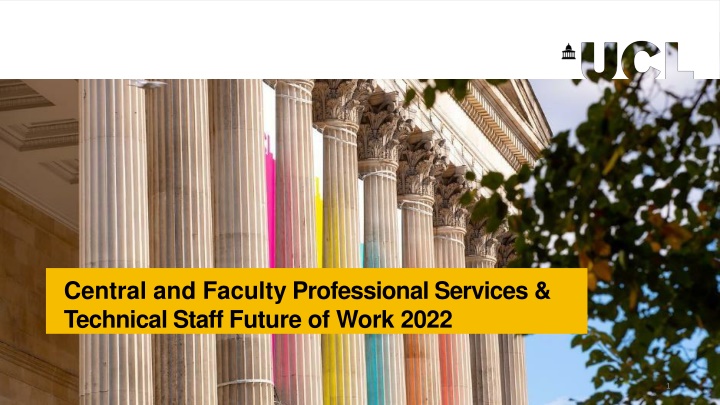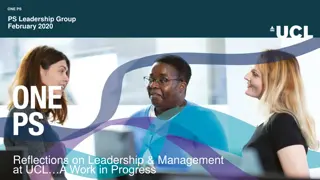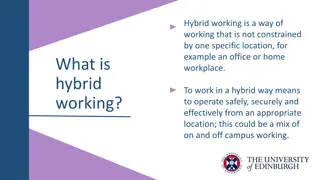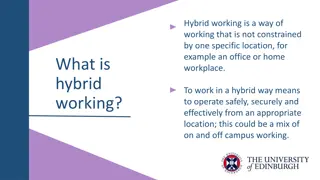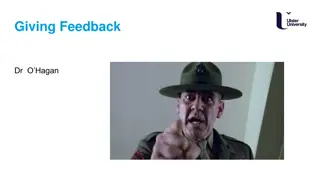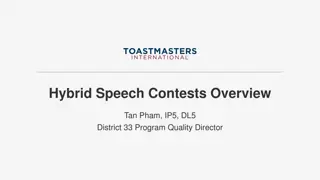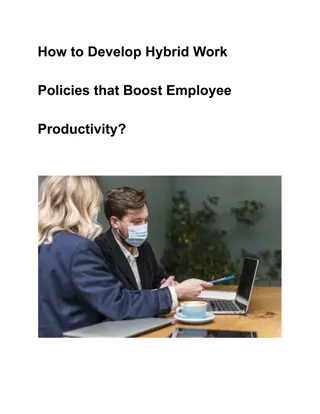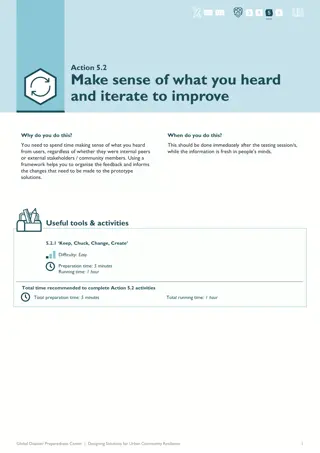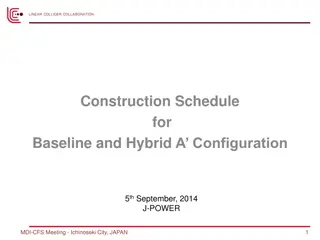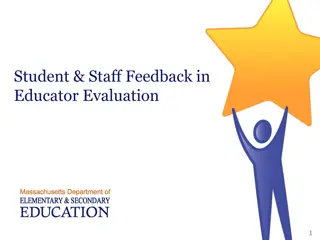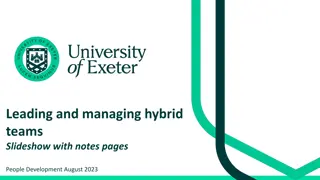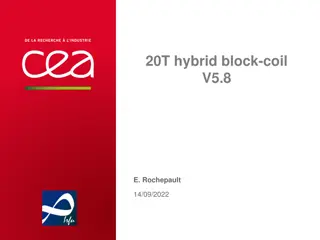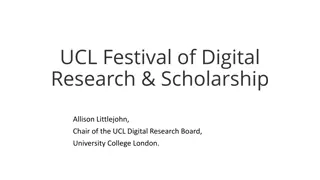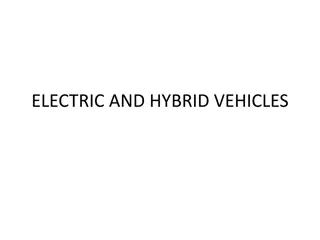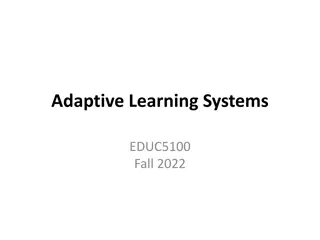UCL Staff Feedback on Hybrid Work Model Implementation
UCL conducted a survey among staff to gather feedback on the interim guidance for transitioning back to onsite work. The survey highlighted staff support for a hybrid work model, emphasizing productivity, efficiency, and well-being benefits. Staff also expressed a preference for clear expectations and organizational commitment to the hybrid work model. The feedback aims to shape a new work model at UCL that balances onsite and remote work effectively.
Download Presentation

Please find below an Image/Link to download the presentation.
The content on the website is provided AS IS for your information and personal use only. It may not be sold, licensed, or shared on other websites without obtaining consent from the author.If you encounter any issues during the download, it is possible that the publisher has removed the file from their server.
You are allowed to download the files provided on this website for personal or commercial use, subject to the condition that they are used lawfully. All files are the property of their respective owners.
The content on the website is provided AS IS for your information and personal use only. It may not be sold, licensed, or shared on other websites without obtaining consent from the author.
E N D
Presentation Transcript
Central and Faculty Professional Services & Technical Staff Future of Work 2022 1
Context In June 2021 UCL launched interim guidance for staff and managers following feedback from staff via an all- staff survey in March 2021. The interim guidance defined two broad categories of role Provided supporting guidance for managing people which focused particularly on handling the transition back to onsite work Since the implementation of the guidance we have been seeking feedback to understand how it has landed with managers and staff, with a view to developing the right new model of work for UCL
What we asked staff We asked UCL staff: How suitable do you think the interim guidance is for your team /area of the university Is 40% the right minimum baseline for Category B What are the benefits of the guidance What are the challenges experienced in implementing the guidance How should we develop the guidance
Great engagement The survey was distributed to 15,951 staff at UCL via confidential link 3,891completed the survey giving a response rate of 24.39%. EDI networks
What staff said: What they like about the interim guidance They are resoundingly in favour of maintaining a hybrid model of work for productivity, efficiency and wellbeing and as response to the changing external environment They feel it has enhanced flexibility and work-life balance They are hugely positive about the opportunity to interact and collaborate in person They value the efficiency and cost savings provided by less time spent travelling to the workplace They value a minimum % expectation of time spent onsite in providing a fair and equitable baseline across teams supporting the setting of a clear expectations
What staff said : : What they would like to see: UCL state an organisational position on why a hybrid model of work is right for the institution, highlighting: the purpose and value of onsite and remote work a vision for what community means in a hybrid model UCL consider whether the current baseline of time spent onsite is appropriate for all roles An activity-led approach emphasised by managers when planning time spent working onsite and remotely The working environment adapted to better accommodate hybrid working with particular focus on technology and appropriate workspaces
What staff said : : UCL staff would like to see A suite of resources to support managers in implementing the guidance effectively with focus on: Managing ad hoc, informal and formal flexible working requests How to make time spent onsite count in a hybrid environment Supporting disabled staff and dealing with reasonable adjustment requests Managing sensitive and challenging cases where staff require additional support
Summary from Listening Exercise Staff see the guidance as broadly suitable and has positively impacted their employee experience Staff would like UCL to state an organisational position on why a hybrid model of work is right for the institution There is considerable support for the maintenance of a baseline of time spent onsite for Category B (and to maintain a 40% minimum) There is enough commentary around this for UCL to give consideration as to whether a baseline of time spent onsite is appropriate for all roles Staff are resoundingly in favour of an activity-led approach when planning time spent working onsite and remotely, whether a baseline is maintained or not A suite of resources to support managers in implementing the guidance effectively is commonly requested as is the working environment being adapted to better accommodate hybrid working
Further consideration Should we have a third category of Remote first ? Review in central Professional Services felt this could have benefit if used in exceptional circumstances. For users of Bidborough House, are developing estates plans that may impact on available space in the future.
Any questions? at this stage
Future of Working 2022 On-site First - more than 80% on site Description: For roles and teams that are required to spend most of their time working on-site. Definition: Requirement to spend most of the time on-site as determined by local leadership Hybrid - 20% to 80% on site Description: For roles and teams that are required to work both on-site and remotely for a reasonable proportion of their time. Definition: Requirement to spend a minimum 20% of the time on-site using an Activity Led Approach Remote First - less than 20% on site Description: For roles and teams that are required to spend most of their time working remotely. Definition: Requirement to spend most of the time working remotely due to the nature of the work undertaken as determined by local leadership
Future of Working 2022 Hybrid - Activity led approachh And: i) People: ii) Space / environment: iii) Time: iv) Team / learning: v) Collaboration and innovation: vi) Wellbeing: UCL's Mission Division/ Department/ Team objectives Role requirements With individual arrangements also possible via flexible working and reasonable adjustments. Venn Diagram 1 portraying the interrelation of UCL s mission, divisional, departmental, and team objectives as well as role requirements as overriding principles.
Future of Working 2022 Features of new arrangements Applies to all PS and technical staff Importance of management support Introduce regular working patterns with sufficient and reasonable prior notice of any changes Digital tools and buildings Flexibility High profile launch Metrics
Future of Working 2022 Guidance developed: Implement an activity led approach Departments to organise time spent on-site using Activity Led Framework. Additional guidance also available for managers Set working patterns where possible and reasonable notice of modification Flexible working Reasonable adjustments MUST be considered Comms, engagement and training Conversations July through to September Go Live OCTOBER Resources to support the guidance and implementation
Future of Working 2022 What we are asking of line managers and team From July to end of September Consider what activities are best done on-site Determine if you have any staff that could be On-Site First or Remote First Discuss with your team the minimum percentage of time and what activities they need to be on-site for Meet with staff who have individual circumstances to discuss if the team arrangements need / can be adjusted for them
Future of Working 2022 Support Toolkits and additional guidance Line manager guidance on how to implement the new guidance and FAQs for staff and managers Guidance for staff working remotely Form to capture team working patterns/ potential impact on department objectives and service delivery Briefing pack for Department Heads to share guidance with teams and next steps Examples of Remote and In-Person Activities Managing Performance with remote teams Hybrid Meetings, using technology and space booking Managing Flexible Working Requests Reasonable Adjustments Human Resources Business Partner Drop in sessions for line managers to bring questions or issues to air and discuss Training - Flexible Working and Reasonable Adjustments
Support | Drop in sessions No need to book just join one or more of the following 26 July 2022 at 2pm 4 August 2022 at 2pm 10 August 2022 at 2pm 24 August 2022 at 2pm 8 September at 2pm 21 September 2022 at 2pm 5 October 2022 at 2pm
Support | Topic briefings Details to follow Managing requests for reasonable adjustments Video and live sessions Managing flexible working requests
